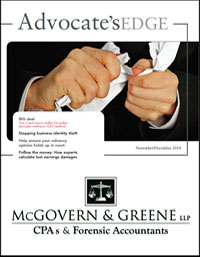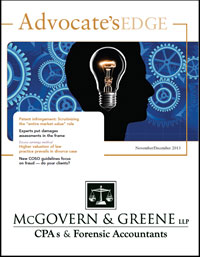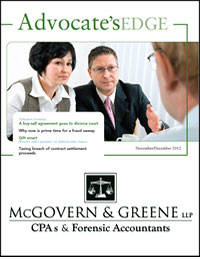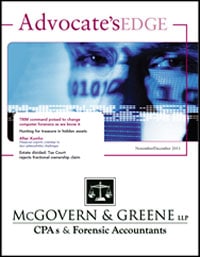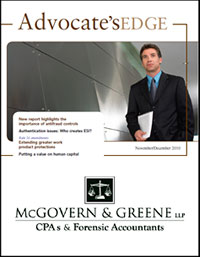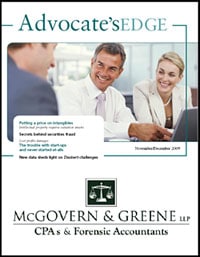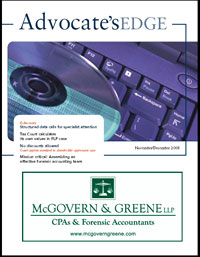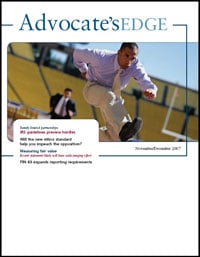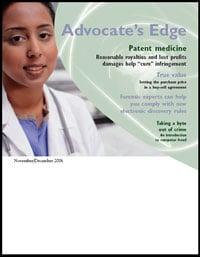Advocate’s Edge
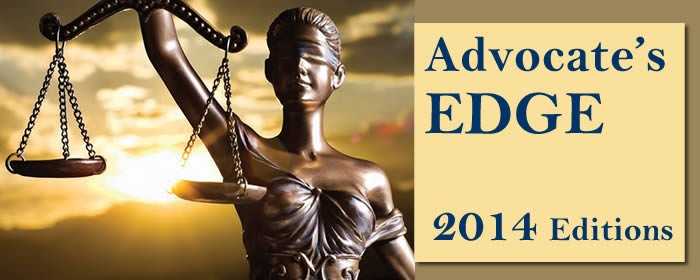
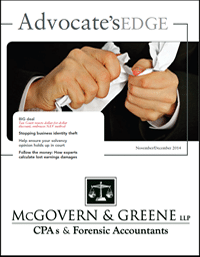 NOV/DEC 2014 Issue of Advocate’s Edge
NOV/DEC 2014 Issue of Advocate’s Edge
BIG deal
Tax Court rejects dollar-for-dollar discount, embraces NAV method
The debate over the appropriate valuation discount for the built-in gain (BIG) tax continues, with the U.S. Tax Court recently opposing a dollar-for-dollar discount. In Estate of Richmond, the Tax Court also explained that the net asset value (NAV) method is more appropriate than an income capitalization approach when valuing a marketable securities holding company. This article discusses the issues at stake. A sidebar explains why the estate was assessed a 20% penalty on its underpayment of tax.
Follow the money: How experts calculate lost earnings damages
When calculating lost earnings damages, financial experts consider several components, including base earnings, retirement benefits and fringe benefits. This article talks about the data that experts review as well as how they handle such contentious issues as variable compensation (commissions, overtime and performance bonuses).
Help ensure your solvency opinion holds up in court
The need for a solvency opinion can arise in a variety of litigation settings, including fraudulent conveyance, bankruptcy alter ego and due diligence actions. This article explains how such analysis questions management’s assumptions and projections and how experts apply three tests — balance sheet, cash flow and adequate capital — to determine solvency.
Stopping business identity theft
For many business owners, their identity and their company’s identity are virtually the same, and a crook’s hijacking of the latter can have crippling effects on their personal and professional lives. This article explains the risks of business identity fraud and provides tips for preventing it, including how to enlist employees’ help.
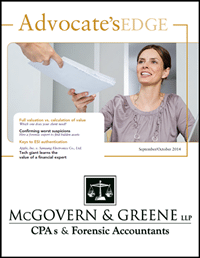 SEP/OCT 2014 Issue of Advocate’s Edge
SEP/OCT 2014 Issue of Advocate’s Edge
Full valuation vs. calculation of value
Which one does your client need?
Attorneys engage appraisal experts to provide both full valuations and calculations of value. While the two may sound the same, full valuations are preferable in certain circumstances, such as litigation and estate and gift tax filings. This article describes the information provided in a full valuation that’s not included in a calculation of value. While the latter approach may be preferable in some situations, a sidebar describes one example of courts’ preferences for full valuations.
Confirming worst suspicions
Hire a forensic expert to find hidden assets
Deceptive spouses — and other parties to litigation — often are experts at hiding assets. To uncover such machinations, forensic accountants use their specialized expertise to gather relevant data, scour it for anomalies and prove that the opposing party is being dishonest. This article explains methods they use to ferret out assets.
Keys to ESI authentication
Electronically stored information (ESI) has assumed a prominent role in commercial and other types of litigation. Like any evidence, it must satisfy the rules for authentication, but it requires sufficient evidence to establish that it hasn’t been changed since its creation or a particular relevant date. This article describes several types of ESI authentication, including hashing, metadata and digital signatures.
Apple, Inc. v. Samsung Electronics Co., Ltd.
Tech giant learns the value of a financial expert
After a jury initially awarded Apple about $1 billion in a case against Samsung, the district court ordered a retrial on damages. Apple’s own damages experts concluded that it wasn’t eligible for lost profits, but Apple declared — less than 24 hours before the retrial was to begin — that it intended to argue for those lost profits anyway. This article explains why the court excluded Apple’s new lost profits theory.
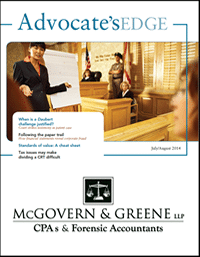 JUL/AUG 2014 Issue of Advocate’s Edge
JUL/AUG 2014 Issue of Advocate’s Edge
When is a Daubert challenge justified?
Court strikes testimony in patent case
The percentage of successful Daubert challenges to damages in patent cases might be small, but this article looks at one case in which the challenge was deemed appropriate because the patent expert’s reasonable royalty testimony was neither reliable nor tied to the facts. A sidebar discusses a case which demonstrated the limits of district courts’ “gatekeeper” role in admitting and evaluating the reliability of expert testimony.
Following the paper trail
How financial statements reveal corporate fraud
Corporate fraud often is concealed when a company intentionally misrepresents material information in its financial reports. This article discusses different types of misrepresentations that can result from the misapplication of accounting principles, overly aggressive estimates of figures and material omissions. It also covers how CPAs can uncover manipulation that might not be apparent to the untrained eye.
Standards of value: A cheat sheet
Attorneys aren’t expected to be valuation experts, but a basic understanding of the various standards of value enables them to work more effectively with their appraisers — and better serve their clients. This article describes four kinds of value: “fair,” “fair market,” “investment” and “intrinsic.”
Tax issues may make dividing a CRT difficult
When dividing assets in divorce, charitable remainder trusts (CRTs) usually are split 50-50 into two separate trusts. Tax issues, however, can make such divisions trickier than they might first appear. This article explains the tax implications of two types of “split-interest” trusts: charitable remainder annuity trusts (CRATs) and charitable remainder unitrusts (CRUTs). It also discusses whether divorcing spouses might be disqualified persons with respect to their original trust.
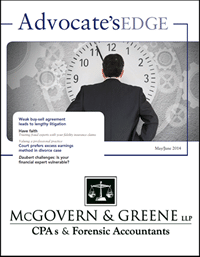 MAY/JUN 2014 Issue of Advocate’s Edge
MAY/JUN 2014 Issue of Advocate’s Edge
Weak buy-sell agreement leads to lengthy litigation
Closely held businesses often rely on buy-sell agreements to ensure a smooth transition when an owner exits the company. But the agreement also needs to provide a clear method for valuing the shares for repurchase. This article describes a court case that resulted when a buy-sell agreement didn’t include the value for company stock shares and the two parties couldn’t subsequently agree on a valuation method. A sidebar explains why using valuation formulas in a buy-sell agreement can be problematic.
Have faith
Trusting fraud experts with your fidelity insurance claims
When businesses pursue civil actions against occupational fraud perpetrators, they generally settle the case or receive favorable verdicts — but they rarely recover the full amounts of their losses. Fidelity insurance is designed to help bridge that gap. Unfortunately, as this article explains, proving larceny or embezzlement losses to an insurer can be challenging. A forensic accountant can help companies meet insurers’ exacting requirements.
Valuing a professional practice
Court prefers excess earnings method in divorce case
Experts on opposing sides commonly rely on different methods when valuing a business. But that doesn’t mean all methods are equally valid. The particular circumstances — including the type of litigation and kind of business — may dictate that one method is preferable to the other. This article discusses one divorce case in which the court found that the excess earnings method was superior to the price-to-revenue method in valuing a dental practice.
Daubert challenges: Is your financial expert vulnerable?
The U.S. Supreme Court’s 1999 opinion in Kumho Tire Co. v. Carmichael made clear that the Daubert criteria for admissibility of expert testimony applies to all types of experts — including financial witnesses. In the years since Kumho, PricewaterhouseCoopers has regularly examined written opinions that address Daubert challenges. This article looks at its latest report, which can help plaintiffs and defendants choose expert witnesses.
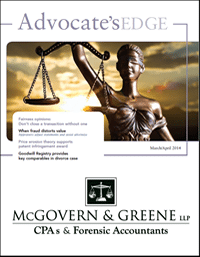 MAR/APR 2014 Issue of Advocate’s Edge
MAR/APR 2014 Issue of Advocate’s Edge
Fairness opinions: Don’t close a transaction without one
In a fairness opinion, a qualified professional confirms that the terms of a proposed transaction are “fair” from a financial perspective. These opinions can facilitate transactions, reduce the odds of disputes among the parties and provide legal protection in the event of litigation. This article discusses who should offer fairness opinions and the variety of transactions in which they can benefit both buyers and sellers. A sidebar describes the analyses used in an opinion that are similar to three common valuation methodologies.
When fraud distorts value
Appraisers adjust statements and assist attorneys
Among the many negative consequences of occupational fraud, one is rarely mentioned: how fraud affects a company’s value. Schemes involving asset misappropriation, corruption and financial misstatements can distort value. To ensure realistic value conclusions, professional appraisers must adjust financial statements when the existence of fraud is known. This article explains how they go about it.
Price erosion theory supports patent infringement award
Calculating patent infringement damages for lost profits or reasonable royalties is almost always complicated, especially when it involves the theory of price erosion. Although price erosion can be difficult to establish, it can lead to significant damages awards — as the defendants learned the hard way in a case involving high-efficiency power converter systems. This article explains why the appeals court concluded that there was sufficient evidence for the jury to have accepted the plaintiff’s pricing estimate.
Goodwill Registry provides key comparables in divorce case
Should valuations of professional practices such as law firms and medical practices include an amount for goodwill? This question continues to pop up in divorce cases. This article looks at one such case that highlighted a tool that is often used to assist in valuing goodwill: the Goodwill Registry, which many valuators use as a “sanity check” for goodwill numbers calculated using other methods.
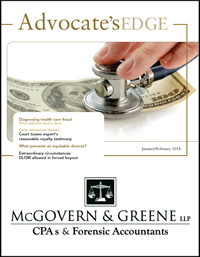 JAN/FEB 2014 Issue of Advocate’s Edge
JAN/FEB 2014 Issue of Advocate’s Edge
Diagnosing health care fraud
What employers need to know
With so much money running through the health care system, it’s no surprise that some medical providers are practicing fraud. This article discusses five types of fraud to which public and private health insurers, including self-insured employers, are vulnerable. These involve various forms of misrepresentations of services rendered. The article also lists red flags that might signal fraud.
Patent infringement damages
Court tosses expert’s reasonable royalty testimony
Calculating damages in patent infringement cases continues to pose a challenge, with expert testimony on the matter coming under heavy Daubert scrutiny. This article looks at one case in which the judge excluded most of an expert’s proposed damages testimony — despite finding her “highly qualified” and competent to estimate reasonable royalties. A sidebar explains why the judge admonished the expert for failing to consult sufficiently qualified experts.
What prevents an equitable divorce?
In divorce cases, courts try to split assets equitably between the spouses. But the parties sometimes make a court’s job difficult by hiding assets or even by performing their own valuations. This article explains why hiring an experienced financial expert to accurately appraise assets is the key to a fair settlement. Such experts often have forensic accounting backgrounds and know how to use sophisticated methods to value assets, particularly businesses.
Extraordinary circumstances: DLOM allowed in forced buyout
When closely held businesses are appraised, professional valuators often apply a discount for lack of marketability (DLOM). However, in forced-buyout situations, DLOMs are generally only applied under extraordinary circumstances. This article discusses an unpublished shareholder oppression case in which the court found that such circumstances did indeed exist.
This publication is distributed with the understanding that the author, publisher and distributor are not rendering legal, accounting or other professional advice or opinions on specific facts or matters, and, accordingly, assume no liability whatsoever in connection with its use.
GFAS Advocate's Edge Archives
Expert Forensic Accounting Services
Chicago | Las Vegas
FORENSIC ACCOUNTING
SERVICES
Insurance Claims
Accounting Investigations
Mergers & Acquisitions
Due Diligence Reviews
Dispute Advisory Services
Special Examinations
Contract Audits and Recoveries
LITIGATION SERVICES
Expert Witness Testimony
Commercial Damages
Shareholder/Partner Disputes
Bankruptcy and Insolvency
CPA Malpractice Claims
Contract Disputes
Estate and Trust Disputes
Data Mining & Electronic Discovery
FRAUD EXAMINATIONS

